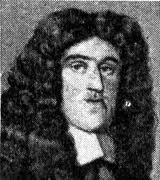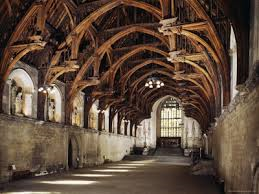This week I thought I’d share an early incarnation of John Eagle, which I wrote over 30 years ago using the first person past tense voice. The setting is Westminster Hall in late 1678 when the Popish Plot is breaking and about to involve our young hero in a deadly game of high stakes intrigue. It’s interesting to view an extract from his first outing and see how far he’s come. I may well revisit this one day as a sort of prequel, with the hero an ancestor of the late eighteenth century John.
So here it is:
I liked the dark; I liked the word writ. I liked the bricks in the mellow walls of Chancery Lane down which I walked with a youthful spring in my step. I liked the noise my square-toed shoes made upon the granite cobbles, manured by horses and sparkling with frost. As with things, so also with people: I liked them to look right and sound right. I liked the sound of my name – John Eagle. I liked the way I looked – a handsome young gallant, or so I believed. Did God make the looking-glass just for me, I wondered? No, that was blasphemy, and we lived in blasphemous times, with new churches to counter it springing up all over the city twelve years after the great fire whose monument stood tall for all that London now aspired to be.
I was hardworking in those days, keen to perfect my art – for the law is an art; an ass too, more so back then. I was on an errand that morning, treading familiar ground, about to fight a familiar fight. One that I relished; one that I was good at, my employer, Mr Bolland, had told me, and I trusted his judgment like a vain boy should. I was bound for Westminster Hall. I entered through the great north door, the wind icy at my back. I had before me the chaos of four courts simultaneously active; they shared the same space, the same sitting time for no good reason than they all laid claim to the hallowed ground of antiquity 90 days in every year. They blew in on one another with the same force as the draught from the door. It was a draughty place even in Trinity when the London summer suffocated the streets. But this was Michaelmas, cold as the Christmas still to come. Litigants packed the entrance and corridors, seeking redress for predictable wrongs. It was court life at full pelt here among the roaring voices, barking dogs and ringing bells that were better termed tocsins, for this was a place of alarm, of baited breath and beating hearts torn between hope and despair; a veritable market of the basest sort, a Smithfield of the law, every shade of ugliness in the animated faces of suitors, defendants and those who acted for them great and small.
I squinted in the dim candlelight, the air thick with the reek of tallow tinged with the sweat of men and the excrement of dogs. Dogs lean and brindled, dogs piebald, skewbald and plain, their owners’ stockings somberly dark where animals nuzzled with playful menace. Clothes were flamboyantly formal, the curled wigs universally brown, black or blond. Privileged men were these, blessed with space to fill with their vacuous phrases like so many well-blown bubbles, good enough to win the day nonetheless should Lady Luck be in town.
I pressed forward with ungodly vigour, all being fair in love and war. There was no love here, but plenty of war. Plenty of blood at one time too and it started with the tramp of lawyers’ feet on that cold stone floor. Guy Fawkes was tried here along with his fellow conspirators; the place brought out the best in the king’s late father; the will of the people, decreed and made good in this chamber, spilled his blood just a stone’s throw away.
There were no screens to separate the different courts; the noises intermingled, the drone of one arena always in earshot of the rest. It was Court of Common Pleas for me this return day. My client’s writ was due – that word again, sharp, precise and full-bellied with meaning – I mustn’t miss my chance; I must make it dart like truth through the falsified air. I peered at the judges black-gowned on their platform, with the royal arms on the wall behind them; at the learned counsel periwigged at the bar in like manner, watched by the court officials, bored but imperious, at the great long table with the records spread thereon.
We attorneys must shift as best we could. My business, I hoped, wouldn’t take long. I espied my counsel and tapped him on the shoulder. Mr Baron Parker, barrister-at-law in close murmur with his eminent neighbours, turned languidly to receive my bow.
‘Mr Eagle, good morning sir,’ he said, raising a finger, half in thought, half in accusation. ‘I fear you’ve had a wasted journey again. The defendant still lurks up there in somewhere or other – the place where all the bumpkins hail from – Shropshire.’ He adjusted his wig, and pursed his lips smugly. ‘This particular case is lasting an age,’ he added, glancing at the judges, who each looked asleep with the same bad smell in his nostrils. ‘An interminable action of trespass I’m afraid. The man denies beating the other man’s servant half to death.’ The figure next to him, a serjeant-at-law, stifled a laugh. ‘He says it was a different servant he beat half to death. Didn’t belong to the man in question at all. Of course he was dead drunk at the time. Can’t make head nor tail of it myself.’
‘But he’s merely traversing specially a single point,’ I said, determined not to share in the joke. ‘Have they had the replication from the plaintiff yet?’ I knew as much law as any of them and didn’t hesitate to show it. And get the same short shift. The serjeant turned away feigning absorption in his notes, rattling his papers that sounded stiff with frost.
Mr Parker condescended to linger a while. ‘Be content with your position, Mr Eagle, and remember we are busy men.’
‘You took our retainer,’ I persisted, barbing the word like an angler’s hook. ‘The fees are mounting. Our client will not be pleased.’
‘A mere trifle in my view,’ he said. ‘As you are a mere attorney.’
My employer had warned me what to say at such times – nothing. Swallow all slights, he said, it’s the surest way to opulence in our profession. Take your revenge another time in small, spiteful ways should chance arise. And so I erred on the side of meekness – just. ‘A mere attorney yes, but an honourable one. Delay to my client is the greater wrong, not the money. With a neglectful sheriff afoot, it may be a year, possibly two before the defendant is found and brought to court.’
‘You know as well as I, that is not uncommon,’ he answered with a shrug. ‘The law is impervious to change.’
‘Know you the Earl of Shaftesbury?’ I asked, unable to repress a smirk.
‘I know of him,’ he replied, his cravat joggling as he swallowed hard, wrong-footed at last.
‘Our client is a relative, and not a distant one. This case should be at issue. We both know it is so. I prepared it at length, in good law hand on good vellum. But the Devil is in the detail, is it not?’
‘Your meaning being?’
‘My meaning being, that if you’d bothered to scrutinise our client’s identity you might have advised us differently. It was advice, supposedly the best, that we paid you for in the first instance.’
‘A capias seemed the best option.’ He was trying to yawn for effect. He was faltering, flustered like a moth-eaten filazer scratching out writs in the office next door.
‘No, bill procedure in the King’s Bench was the best option,’ I replied. ‘He’d have no need of all these writs one after the other. I told our client as much when I first met him.’
‘You told him? Then why…?’ he tailed off.
‘Because you are the learned counsel whose advice it is appropriate to seek. No matter what my private view may have been, I said we would seek opinion from a higher authority. That authority was you. I named you loud and clear, Mr Robert Parker. No doubt you have done your reputation the world of good in this particular case.’
‘All right John, listen to me,’ he said, placing his hand on my arm. ‘Point taken. I erm…well, you can see how things are this morning, I can hardly hear myself think. I’m due to speak next on an action upon the case. Leave your matter with me. It was a debt you say?’
‘No, another trespass,’ I answered, almost with a shout. It was clear he knew nothing of the case.
‘Oh yes of course, another trespass. I’ll see what I can do.’ He edged away awkwardly, his last words drowned by a barking dog. I think what he said was this: ‘It’s too late for Michaelmas you understand. It will have to be Hillary, John.’
Hillary John – John Hillary. I chewed the words over and came away with a bad taste in my mouth. I got to thinking about rich men beating their servants half to death. I dreamed of servants of my own one day, men and women, girls and boys, with a few of the king’s spaniels thrown in for good old yapping measure. I wouldn’t beat any of them, not even the dogs. I’d treat them all kindly, make them love me like no master was ever loved. Providing they were lovable in return.
But the man waiting in our office when I returned was a servant too. Judging by his face he was neither loving nor loveable, and what was true of the servant was even truer of his master. The latter had a name that much of London would soon come to dread. His name was Titus Oates. 

